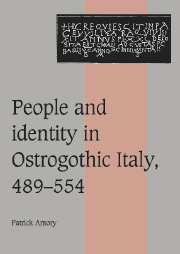Book contents
- Frontmatter
- Contents
- Preface
- List of rulers
- Terminology and vocabulary
- List of abbreviations
- Map of Ostrogothic Italy
- Introduction: Studying the barbarians in late antiquity
- 1 Ethnicity, ethnography and community in the fifth and sixth centuries
- 2 The Ravenna government and ethnographic ideology: from civilitas to bellicositas
- 3 Individual reactions to ideology I: names, language and profession
- 4 Complementary and competing ideals of community: Italy and the Roman Empire
- 5 Individual reactions to ideology II: soldiers, civilians and political allegiance
- 6 Catholic communities and Christian Empire
- 7 Individual reactions to ideology III: Catholics and Arians
- 8 The origin of the Goths and Balkan military culture
- Conclusion
- Appendix 1 The inquiry into Gundila's property: a translation and chronology
- Appendix 2 The Germanic culture construct
- Appendix 3 Archeological and toponymic research on Ostrogothic Italy
- Appendix 4 Dress, hairstyle and military customs
- Prosopographical Appendix: A prosopography of Goths in Italy, 489–554
- Bibliography
- Index
- Cambridge Studies in Medieval Life and Thought Fourth Series
6 - Catholic communities and Christian Empire
Published online by Cambridge University Press: 03 December 2009
- Frontmatter
- Contents
- Preface
- List of rulers
- Terminology and vocabulary
- List of abbreviations
- Map of Ostrogothic Italy
- Introduction: Studying the barbarians in late antiquity
- 1 Ethnicity, ethnography and community in the fifth and sixth centuries
- 2 The Ravenna government and ethnographic ideology: from civilitas to bellicositas
- 3 Individual reactions to ideology I: names, language and profession
- 4 Complementary and competing ideals of community: Italy and the Roman Empire
- 5 Individual reactions to ideology II: soldiers, civilians and political allegiance
- 6 Catholic communities and Christian Empire
- 7 Individual reactions to ideology III: Catholics and Arians
- 8 The origin of the Goths and Balkan military culture
- Conclusion
- Appendix 1 The inquiry into Gundila's property: a translation and chronology
- Appendix 2 The Germanic culture construct
- Appendix 3 Archeological and toponymic research on Ostrogothic Italy
- Appendix 4 Dress, hairstyle and military customs
- Prosopographical Appendix: A prosopography of Goths in Italy, 489–554
- Bibliography
- Index
- Cambridge Studies in Medieval Life and Thought Fourth Series
Summary
In the maelstrom of allegiances and identities competing in sixth-century Italy, religious affiliation played not a small role. The plight of Gundila only hints at the impact that struggles over belief had upon the individual. Contrary to most studies, however, religious affiliation failed to match neatly political constituency, let alone the labels “Goth” or “Roman.”
The Catholic church, in particular, has too frequently been presented as a monolithic citadel first forced to collude with Theoderic in opposition to a heretical emperor, then happily reconciled with the East against the Arian rulers and their supposedly Arian followers. In fact, popes disagreed with their predecessors, struggled with kings and emperors throughout the lifetime of the Gothic kingdom, faced internal and external ecclesiastical quarrels over faith, and never led a unified political theology, let alone a unified attitude toward the label “Goth” or even Arian belief. This chapter and the next examine this chaotic situation in detail, and set the context of ecclesiastical politics and religious heterodoxy into a cultural framework that was constantly affected by secular politics, but which never mirrored secular factions.
The question of Arianism is pungent. How did evolving ideals of Catholic community affect attitudes toward the Arian king and his followers (of whatever belief)? The sixth-century papacy inherited mutually contradictory Christian conceptions of community with which it struggled to define its claims to supremacy. Catholics cohabited the Italian peninsula not only with Arians and the new settlers, but with the ancient vestiges of a divided Christianity.
- Type
- Chapter
- Information
- People and Identity in Ostrogothic Italy, 489–554 , pp. 195 - 235Publisher: Cambridge University PressPrint publication year: 1997
- 1
- Cited by



